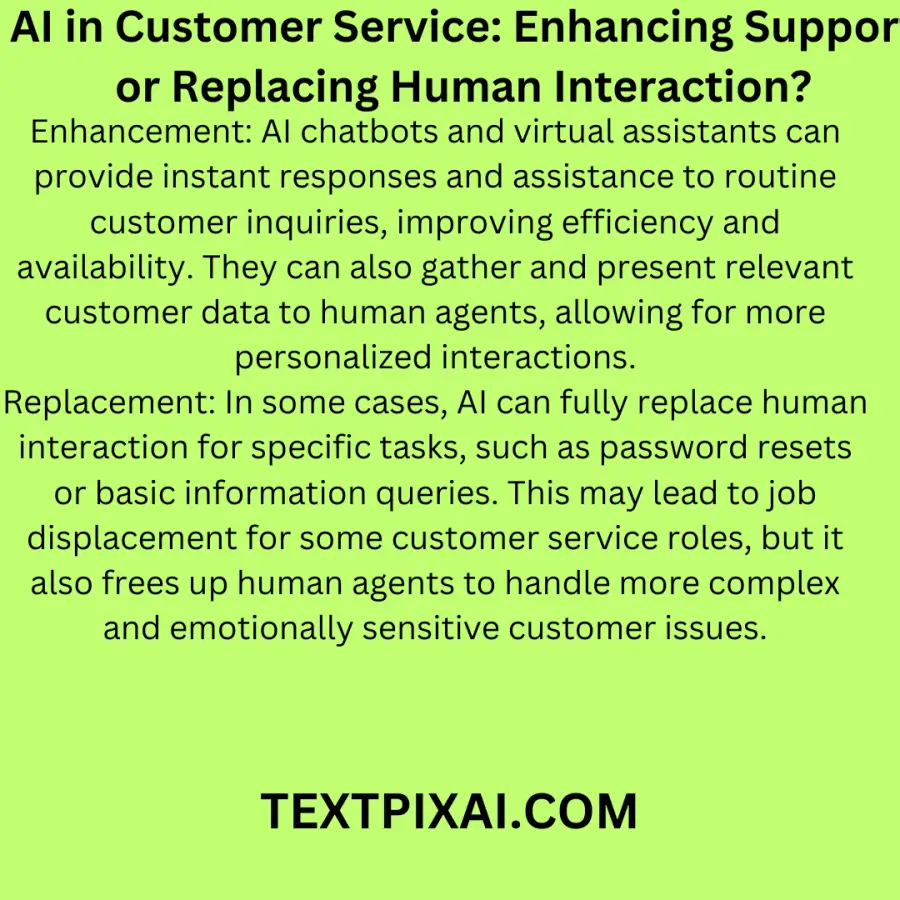AI in Customer Service: Enhancing Support or Replacing Human Interaction?
1. Introduction
In today's fast-paced digital age, Artificial Intelligence (AI) has revolutionized numerous industries, including customer service. As companies strive to enhance their support systems and provide seamless interactions with customers, the role of AI in customer service is a topic of great significance. This article will delve into the various aspects of AI in customer service, exploring whether it is primarily enhancing human support or gradually replacing human interaction.
Artificial Intelligence (AI) is no longer confined to science fiction. It has seamlessly integrated into our daily lives, and one of its most prominent applications is in customer service. Companies are increasingly leveraging AI to enhance support, improve efficiency, and personalize interactions. However, there is a lingering question: Is AI enhancing the support provided by humans, or is it gradually replacing human interaction altogether? Let's explore this intriguing dilemma.
2. Understanding AI in Customer Service
This section will provide readers with a clear understanding of what AI in customer service entails.
Before we dive deeper, it's essential to grasp what AI in customer service means. AI encompasses a range of technologies, including machine learning, natural language processing, and chatbots, which enable automated interactions with customers. These systems are designed to handle inquiries, resolve issues, and streamline the customer service process.
You may also like to read:
The Dark Side of AI: Unveiling the Potential Risks and Pitfalls
3. The Evolution of Customer Service
A historical perspective on the evolution of customer service will be discussed here.
Customer service has come a long way from its humble beginnings. We will explore the evolution of customer service, from face-to-face interactions to telephone support, and now, the digital age with AI at its core.
4. Enhancing Efficiency with AI
This section highlights how AI enhances the efficiency of customer service operations.
AI-driven systems can handle a vast number of customer inquiries simultaneously, significantly reducing wait times and increasing efficiency. We will delve into specific examples and case studies to showcase this.
5. Personalization and AI
AI's role in personalizing customer interactions will be discussed here.
One of the remarkable aspects of AI is its ability to provide highly personalized experiences. We will explore how AI tailors recommendations and interactions to individual customers, thereby enhancing their satisfaction.
6. The Human Touch in Customer Service
This section emphasizes the importance of human interaction in customer service.
Despite AI's capabilities, the human touch remains irreplaceable in certain situations. We will discuss the scenarios where human interaction is indispensable and how AI and humans can collaborate effectively.
7. AI-Driven Chatbots
The role of AI-driven chatbots in customer service will be elaborated upon.
Chatbots are one of the most visible forms of AI in customer service. We will explain how they work, their benefits, and potential limitations.
8. AI and Multilingual Support
This section discusses how AI can break language barriers in customer service.
AI-powered language translation and understanding capabilities enable companies to provide support to customers around the world. We'll explore how this helps businesses expand their global reach.
9. Data Security and AI
The importance of data security in AI-driven customer service will be addressed.
With the increasing reliance on AI, data security becomes a paramount concern. We will discuss the measures taken to ensure customer data remains safe and protected.
10. The Cost Factor
This section explores the cost-effectiveness of implementing AI in customer service.
While AI offers many advantages, there are also costs associated with its implementation. We will examine the cost-benefit analysis and discuss whether AI justifies its expense.
11. Customer Feedback and AI
The role of AI in collecting and utilizing customer feedback will be discussed.
Customer feedback is invaluable for businesses. AI can efficiently gather and analyze this feedback, allowing companies to make data-driven improvements.
12. AI's Role in Self-Service Options
This section explores how AI enables self-service options for customers.
AI-driven self-service options empower customers to find solutions independently, reducing the need for direct human intervention.
13. Balancing AI and Human Interaction
Finding the right balance between AI and human interaction is crucial.
We will discuss strategies for companies to strike a balance between automated AI interactions and maintaining a human touch in customer service.
14. Case Studies
Real-world case studies will illustrate the effectiveness of AI in customer service.
We will present case studies of companies that have successfully implemented AI in customer service and the outcomes they've achieved.
15. Conclusion
In the conclusion, we will summarize the key points and provide insights into the future of AI in customer service.
In conclusion, AI in customer service is undeniably enhancing support by improving efficiency, personalization, and data analysis. However, it should not be viewed as a complete replacement for human interaction. The ideal approach is to strike a balance that harnesses the strengths of both AI and human agents to provide exceptional customer experiences.
FAQs
1. Is AI completely replacing human customer service agents?
2. Can AI effectively handle complex customer inquiries?
3. What are the security measures in place to protect customer data when using AI?
4. How do companies gather and utilize customer feedback through AI?
5. What industries have seen the most significant impact from AI in customer service?








